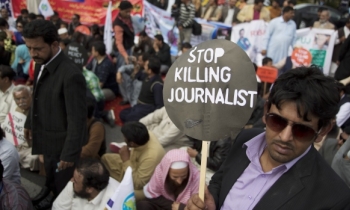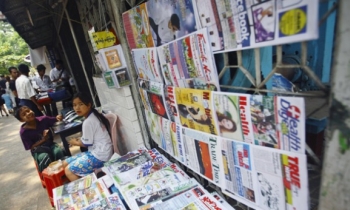WHEN Hurricane Katrina hit America’s Gulf coast late in the summer of 2005, the Daily Mail was there.
But headlines such as “City sunk by the wrath of Katrina” and “Come hell or high water, the music will go on”, were only the beginning of its involvement in a disaster that claimed 1,800 lives. Beyond the trenchant prose of the voice of middle England, Daily Mail and General Trust (DMGT), the newspaper’s parent company, owns a clutch of companies that were touched by the devastation in Louisiana.
The DMGT subsidiary RMS models risk and analyses world events for insurance clients. Another, Dolphin, runs a database of dangerous chemicals on behalf of the Red Cross relief agency. And Genscape monitors the output of power stations as well as international electricity-transmission routes.
It proves that the 113-year-old media company stretches far beyond Lord Rother-mere’s press empire. However, such operations excite far less interest in investors more attuned to the tricky challenges facing the newspaper industry.
The group’s A shares, which have fallen more than 30% in six months, have been marked down almost as far and as fast as those of pure newspaper rivals such as Trinity Mirror and Johnston Press. DMGT is consistently pigeonholed with its news-stand rivals, which are presently trading on little more than seven times earnings, even though it has put together an array of exhibitions, data firms and financial media that are supposed to be more defensive. DMGT’s rivals in this sphere, such as United Business Media and Informa, owner of Lloyd’s List, enjoy price/earnings ratios of closer to 12.
DMGT, still controlled by the founding Harmsworth family, has undergone a quiet reshaping, as the chairman, Jonathan Harmsworth, the 4th Viscount Rother-mere, accelerated the work of his father, whom he succeeded in 1998.
The group has diversified with several acquisitions. However, the latest share slide has caused consternation at DMGT’s Kensington headquarters.
“We do care about the share price � there is a perception out there we don’t,” said Peter Williams, the group’s finance director. “It has been pretty painful over the past few months.” This week, for the first time in its recent history, DMGT will report annual results showing that less than half of the group’s profits are coming from Associated � home to the Daily Mail � and Northcliffe, its regional newspapers arm.
To some degree this has occurred because the part-owned subsidiary Euromoney Institutional Investor bought Metal Bulletin, and because Northcliffe sold its Aberdeen titles to DC Thomson.
But the real shift has come from the bedding down of growing divisions such as DMG Information, whose 20% operating margins � twice those of Associated � were the best in the group last year, delivering £68m of profit. Its investments include Environmental Data Resources, which produces reports for firms that lend money on commercial property.
Associated has been held back by the estimated £20m in accumulated losses at the Evening Standard and London Lite, which is battling for the readership of young commuters.
DMGT’s diversification strategy is now being aped by Guardian Media Group. It is owned by the Scott Trust, whose remit is to preserve the editorial independence of the loss-making Guardian newspaper. Armed with £650m from the sale of a minority stake in Auto Trader owner Trader Media, chief executive Carolyn McCall has linked up with the private-equity firm Apax to bid for Emap’s business assets.
DMGT’s Williams said: “It is a complicated story. The fact is we are not very simple; we are diversified. We think that is a strength. Some think it is weakness.”
Nick Dempsey, analyst at Merrill Lynch, believes the former. He has a 680p sum-of-the-parts valuation on the business, a 16% premium to its share price. His figure includes a 10% discount for family control, reflecting the fact that the chances of a break-up are nonexistent. The Harmsworths own 89% of the voting shares and 24% of the more-frequently traded A shares.
DMGT also concedes it needs to improve investor relations. “We are doing quite a lot of work on that,” said Williams.
There are some downsides. Business media are not immune to an economic slowdown, particularly operations that serve the property and finance sectors. While Euromoney posted another leap in underlying profits last week, management warned that advertising spending by investment banks was beginning to show the first signs of weakness.
And some of DMGT’s fringe assets are in decline. Teletext has been savaged by the rise of digital television, and the classifieds paper Loot had its value written down and is bracketed for sale.
DMGT is expected to hang on to the Ideal Home Show, whose income has slipped as the home-improvement boom tails off. However, similar consumer shows in America are being sold, while DMGT concentrates on trade events that sell gifts and swimwear.
Williams said: “I just think we have had this massive negative view on consumer media per se. It’s across the board.”
Others feel they are being unduly punished by bearish investors. Internet competition means that traditional newspapers are under the cosh, but the same publishers have been investing heavily to grab a share of faster-growing online income.
Sly Bailey, boss of Trinity Mirror, which is back in growth after a recovery in the second half of this year, said: “The doomsayers tend to talk themselves into a death spiral for newspapers. They attribute too much to the structural decline of newspapers and do not give enough weight to the cyclical nature of our markets, such as recruitment.”
Media buyer Zenith Optimedia forecasts 1.1% growth for newspaper advertising next year, the first increase after three years of decline.
But that figure does not factor in publishers’ online interests, where growth is 23%. DMGT owns Prime Location and Jobsite. Trinity has Planetrecruit and Workthing.
Despite some signs of an upturn, Bailey cautioned: “The economic environment is uncertain. It may be stormy in 2008.”
Perhaps another busy hurricane season is just what DMGT needs to underline how far it has moved away from Fleet Street.









